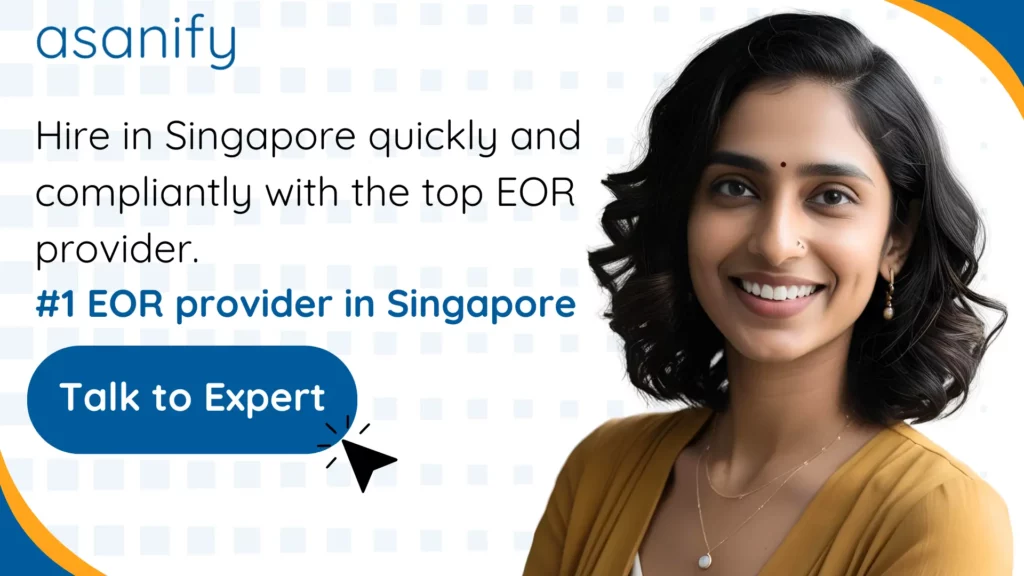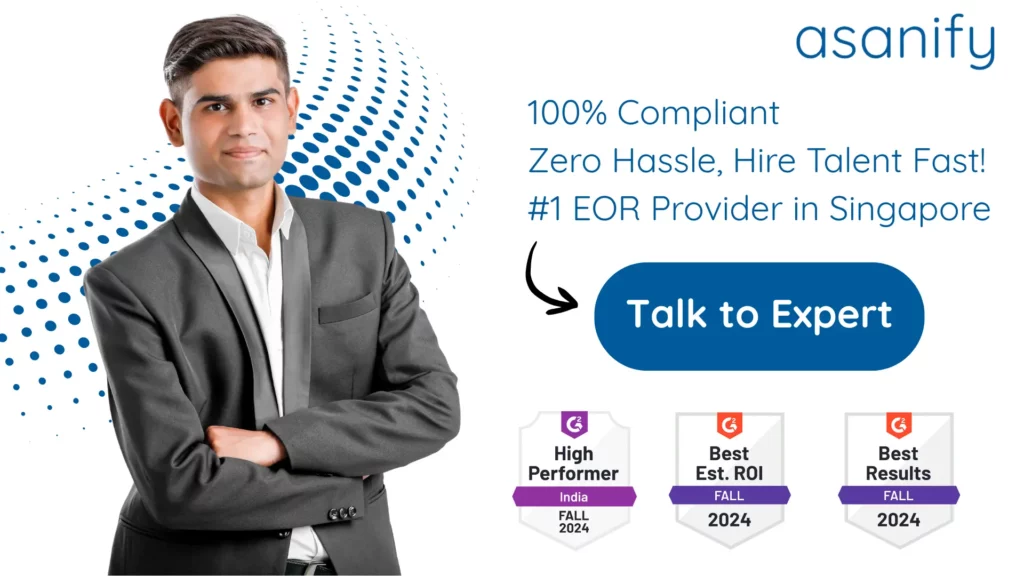Singapore has earned global recognition for its efficient business environment and strong regulatory framework, with a clear and robust set of employment laws forming the foundation of that system. Whether you’re a local employer, HR manager, or an international company hiring talent in Singapore, understanding the country’s legal obligations is essential to maintain compliance and foster a productive workplace. This 2025 guide to labour laws in Singapore covers everything from employee coverage under the Employment Act, statutory leave entitlements, and working hour regulations to termination procedures, foreign workforce management, and how an Employer of Record in Singapore can streamline global hiring.
Table of Contents
- Overview of Singapore’s Labour Law Framework
- Who is Covered Under the Employment Act?
- Key Employer Obligations in Singapore
- Minimum Wage and Salary Regulations
- Working Hours, Overtime, and Rest Days
- Statutory Leave and Holiday Entitlements
- Termination Rules and Notice Periods
- Foreign Worker and Work Pass Regulations
- Anti-Discrimination and Workplace Fairness Guidelines
- Health and Safety Standards at Work
- Using an Employer of Record (EOR) to Hire in Singapore
- Compliance Tips for Employers in 2025
- Conclusion
- FAQs
Overview of Singapore’s Labour Law Framework
Singapore’s primary employment legislation is the Employment Act, which governs the basic terms and conditions of employment for most employees. The Ministry of Manpower (MOM) administers additional regulations, along with specialized frameworks such as the Workplace Safety and Health Act, CPF Act, and Tripartite Guidelines on Fair Employment Practices.
These laws aim to ensure fairness and balance in the employer-employee relationship, encourage workforce productivity, and uphold social harmony.
Who is Covered Under the Employment Act?
The Employment Act is Singapore’s main legislation governing employment terms and conditions. It covers all employees—local or foreign—who work under a contract of service, regardless of their nationality or whether they are employed full-time, part-time, or temporarily. This wide applicability ensures a baseline of protection for most of the workforce in Singapore.
However, the extent of legal protection under the Act varies depending on the nature of the employee’s role and salary level:
- Rank-and-file employees, which include non-managerial and non-executive roles (e.g., clerical staff, technicians, operational workers), receive full protection under the Act. This includes entitlements such as paid annual leave, rest days, overtime pay, sick leave, and protections against wrongful dismissal.
- Managers and executives, especially those earning more than SGD 4,500 per month, receive only partial coverage. They receive protection in key areas such as salary payment, unfair dismissal, maternity leave, and public holidays, but lack coverage for working hours, overtime pay, and rest day entitlements.
It is important for employers to accurately classify roles and understand the coverage scope when drafting contracts and defining entitlements. Misclassification can lead to non-compliance, employee grievances, and legal disputes under the Ministry of Manpower (MOM)’s oversight.
Employers should also ensure that, even when an employee falls outside the full coverage of the Employment Act, the contract clearly outlines the employment terms in a fair, lawful, and mutually agreed manner.
Key Employer Obligations in Singapore
Employers operating in Singapore must comply with the following key legal obligations:
- Issuing itemized employment contracts with clear job scope, salary, work hours, and leave entitlements
- Making Central Provident Fund (CPF) contributions for local employees
- Maintaining employment records (up to 2 years after employment ends)
- Complying with MOM notifications, including submission of employment terms and work pass applications
Failing to meet these requirements can result in fines, administrative sanctions, or reputational damage.

Minimum Wage and Salary Regulations
Unlike many countries, Singapore does not have a universal minimum wage. Instead, it uses the Progressive Wage Model (PWM) to set minimum wages in sectors like:
- Cleaning services
- Security services
- Landscape maintenance
- Retail and food services (in stages from 2023 onward)
For all other sectors, wages are negotiated between employer and employee, subject to market conditions and fair hiring practices.
Working Hours, Overtime, and Rest Days
Under the Employment Act:
- Standard working hours are capped at 44 hours per week
- Overtime pay is 1.5 times the hourly basic rate, applicable for work beyond contractual hours (up to 72 hours/month)
- Employees are entitled to 1 rest day per week, typically Sunday, with compensation if required to work
Employers must track hours and provide compensation as per the contract and MOM guidelines.
Statutory Leave and Holiday Entitlements
Leave entitlements in Singapore depend on an employee’s length of service and whether they are covered by the Employment Act.
Annual Leave
Employees are entitled to 7 days of paid annual leave after one year of service, increasing by one day for each additional year (capped at 14 days).
Sick Leave
Entitlement includes:
- 14 days of paid outpatient sick leave per year
- 60 days of paid hospitalization leave, including outpatient leave
A medical certificate from an approved practitioner is required for eligibility.
Maternity and Paternity Leave
- Maternity leave: 16 weeks for Singaporean mothers; 12 weeks for non-citizens (subject to eligibility)
- Paternity leave: 2 weeks for eligible fathers
Employers may claim reimbursement from the government for part of this leave.
Public Holidays
Singapore observes 11 gazetted public holidays, including Chinese New Year, National Day, and Hari Raya. Employees working on holidays are entitled to either an extra day off or additional pay.

Termination Rules and Notice Periods
Termination can be initiated by either party but must comply with contract terms and statutory notice periods.
Notice Periods
Typically range from 1 day to 1 month, depending on the employee’s length of service and the contract. Payment in lieu of notice is allowed.
Final Payment
Employers must settle all due salary and benefits:
- Within 7 days for employee-initiated resignations
- On last day of work if termination was employer-initiated
Unlawful or abrupt dismissal can result in reinstatement orders or compensation through MOM.
Foreign Worker and Work Pass Regulations
Hiring foreign employees in Singapore requires:
- Valid work passes: Employment Pass, S Pass, or Work Permit, depending on the role and salary
- Quota and levy compliance: Sectors like construction and manufacturing have foreign worker limits and levies
- Fair Consideration Framework: Employers must advertise jobs locally before hiring foreigners
Work pass rules are strictly enforced, and breaches can lead to bans or legal action.
Anti-Discrimination and Workplace Fairness Guidelines
While Singapore currently lacks a comprehensive anti-discrimination law, the Tripartite Alliance for Fair and Progressive Employment Practices (TAFEP) enforces non-binding guidelines to:
- Prohibit discrimination based on age, race, gender, marital status, religion, or disability
- Promote inclusive hiring practices
- Encourage internal grievance handling procedures
The government is moving toward enacting workplace fairness legislation, likely formalizing these standards in the near future.
Health and Safety Standards at Work
The Workplace Safety and Health (WSH) Act requires employers to take proactive steps to ensure the safety and well-being of their employees. Under this legislation, employers must:
- Conduct regular risk assessments to identify and mitigate potential hazards in the workplace
- Provide appropriate protective equipment and safety training to employees based on their roles and exposure to risks
- Maintain a safe and healthy work environment across all settings—whether in offices, factories, or construction sites
Employers are legally responsible for implementing safety protocols, monitoring compliance, and addressing any safety breaches promptly to prevent accidents and protect their workforce.
Using an Employer of Record (EOR) to Hire in Singapore
An Employer of Record (EOR) in Singapore enables international companies to hire local employees without the need to establish a legal entity in the country. Acting as the official employer on record, the EOR assumes responsibility for all key employment functions, allowing the client company to focus on managing day-to-day tasks and performance.
The EOR typically manages the following responsibilities:
- Ensuring employment contracts are compliant with Singapore’s labour laws, including adherence to the Employment Act and applicable tripartite guidelines
- Processing monthly payroll and making CPF contributions for Singapore citizens and permanent residents in accordance with statutory rates
- Handling tax reporting, statutory deductions, and leave tracking, ensuring accuracy and adherence to local employment regulations
- Managing lawful termination procedures, including final salary payment, notice period compliance, and documentation in line with MOM requirements
Asanify, for instance, offers comprehensive EOR services that support seamless hiring across Singapore. Their end-to-end compliance framework is ideal for startups, SMEs, and global teams seeking to enter the Singapore market efficiently and without administrative burden. Partnering with an EOR like Asanify allows companies to onboard talent quickly, stay compliant across jurisdictions, and scale operations with confidence.

Compliance Tips for Employers in 2025
To stay compliant with labour laws in Singapore, employers must adopt a structured and forward-looking approach to workforce management and legal obligations. Compliance is not a one-time task—it requires continuous effort, attention to regulatory updates, and a commitment to ethical employment practices.
Here are key steps every employer should take:
- Regularly audit employment contracts and HR policies to ensure they reflect the latest changes in the Employment Act, tripartite guidelines, and industry-specific norms. This helps prevent inconsistencies and protects both the employer and the employee in case of disputes.
- Stay updated on MOM advisories and progressive wage requirements, especially if your business operates in regulated sectors like cleaning, security, or food services. Regularly reviewing Ministry of Manpower (MOM) updates ensures that your pay structures and benefits remain compliant.
- Maintain thorough documentation for payroll, leave balances, and termination records, as proper recordkeeping is legally required and essential for transparency during audits or employee queries.
- Train HR teams on workplace fairness guidelines, anti-discrimination expectations, and best practices in grievance handling. A well-informed HR function ensures that your organization upholds fair and inclusive workplace standards.
- Consider partnering with an Employer of Record (EOR) to reduce administrative complexity, especially if you’re expanding into Singapore from abroad. An EOR manages contracts, payroll, taxes, and compliance—allowing your business to stay focused on operations without legal risk.
Ultimately, compliance is not just about avoiding penalties—it’s about fostering a trustworthy work environment, improving employee satisfaction, and building a sustainable business that aligns with Singapore’s employment standards and values.
Conclusion
Navigating labour laws in Singapore in 2025 requires a clear understanding of the Employment Act, MOM regulations, and evolving workplace expectations. From fair wages and leave entitlements to safe working conditions and fair hiring practices, employers must stay aligned with national and sector-specific rules.
Whether you’re building a local team or exploring remote expansion, working with an Employer of Record in Singapore can help simplify compliance and reduce operational risks.
FAQs
Most employees, including both locals and foreigners, are covered—though certain managerial or executive roles have partial coverage.
No, but the Progressive Wage Model applies to specific low-wage sectors like cleaning, security, and retail.
The standard is 44 hours per week; overtime rules apply beyond that, with a legal limit of 72 overtime hours per month.
Employees earn at least 7 days of paid leave after one year of service, increasing by one day each year up to 14 days.
Notice periods vary based on the contract and length of service, typically ranging from 1 day to 1 month.
The Central Provident Fund (CPF) is a mandatory savings scheme for Singaporean citizens and permanent residents; employers must contribute monthly.
Yes, employees are entitled to 14 days of outpatient sick leave and up to 60 days including hospitalization leave, if certified by a doctor.
No, all foreign workers must have valid work passes such as Employment Pass, S Pass, or Work Permits issued by MOM.
There is no specific anti-discrimination law yet, but employers must follow the Tripartite Guidelines on Fair Employment Practices.
Not to be considered as tax, legal, financial or HR advice. Regulations change over time so please consult a lawyer, accountant or Labour Law expert for specific guidance.




